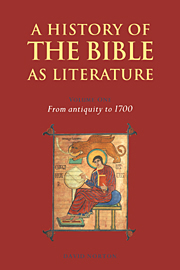Book contents
- Frontmatter
- Contents
- List of plates
- Preface
- List of abbreviations
- 1 ‘This treasure in earthen vessels’
- 2 The early Christians and biblical eloquence
- 3 Jerome
- 4 Augustine and his successors
- 5 The occult text
- 6 The challenge to the translators
- 7 Slaves of the Vulgate
- 8 Creators of English
- 9 From the Great Bible to the Rheims-Douai Bible
- 10 The King James Bible
- 11 Presentations of the text, 1525–1625
- 12 Sixteenth-century movements towards literary praise and appreciation of the Bible
- 13 The struggle for acceptance
- 14 ‘The eloquentest books in the world’
- 15 Versifying the Psalms
- 16 ‘The best materials in the world for poesy’
- Appendix
- Bibliography
- General index
- Biblical index
- Plate section
6 - The challenge to the translators
Published online by Cambridge University Press: 05 June 2012
- Frontmatter
- Contents
- List of plates
- Preface
- List of abbreviations
- 1 ‘This treasure in earthen vessels’
- 2 The early Christians and biblical eloquence
- 3 Jerome
- 4 Augustine and his successors
- 5 The occult text
- 6 The challenge to the translators
- 7 Slaves of the Vulgate
- 8 Creators of English
- 9 From the Great Bible to the Rheims-Douai Bible
- 10 The King James Bible
- 11 Presentations of the text, 1525–1625
- 12 Sixteenth-century movements towards literary praise and appreciation of the Bible
- 13 The struggle for acceptance
- 14 ‘The eloquentest books in the world’
- 15 Versifying the Psalms
- 16 ‘The best materials in the world for poesy’
- Appendix
- Bibliography
- General index
- Biblical index
- Plate section
Summary
The inferior language
The work of all the English translators through to the KJB translators must be seen in the context of the changing status of French, Latin and English. French was for a long time the language of the court and of trade. Latin was the language of learning and religion, hallowed by long tradition and its remoteness from ordinary language. The varieties of English, on the other hand, had, from the time of the Norman Conquest, been the language of a subject people. English slowly became the dominant language, not just for the lower but for the upper classes; more slowly it became an acceptable language for serious literature, for religion and for scholarship.
The merits of Latin and English were discussed in 1401 at Oxford in the course of a debate on the propriety of vernacular translation. The participants were, probably, a friar, Thomas Palmer, who argued against vernacular translation, and an anonymous sympathiser with the followers of Wyclif, the Lollards. Palmer's arguments survive in Latin. A Latin tract by Richard Ullerston and an anonymous English tract take the opposite view. Ullerston introduces the matter thus:
Whether, since it was lawful for St Jerome to translate the sacred canon from Hebrew and Greek into Latin, it is in like manner lawful to translate it into other tongues, less principal and less reputable? And though in the time of our forefathers this point was never in doubt, now indeed so great a dispute has arisen about it that two weighty doctors of this university have been spending the whole time of their lectures upon this question.
- Type
- Chapter
- Information
- A History of the Bible as Literature , pp. 62 - 76Publisher: Cambridge University PressPrint publication year: 1993



